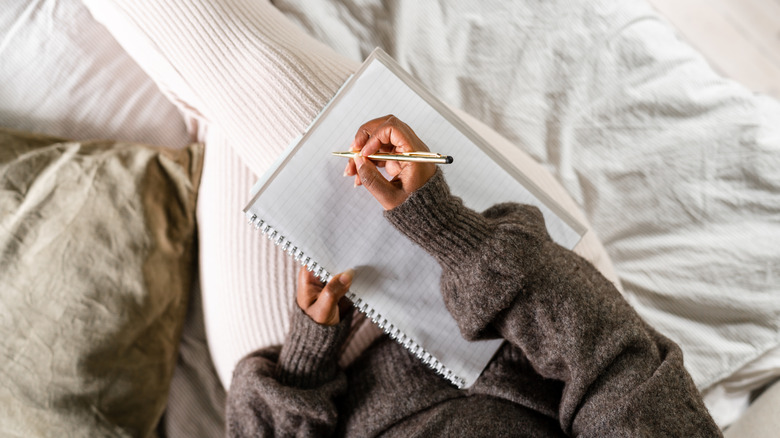One Thing Rick Steves Recommends All Travelers Do (That Doubles As A Free Souvenir)
Chopsticks from China, a Union Jack from the U.K., a sombrero from Mexico — what's better than a store-bought keepsake to remind you of your vacation? If you ask travel expert Rick Steves, his answer would probably be "a journal."
Steves has been running his travel-oriented business, Rick Steves' Europe, since the 1970s, and since then, he's jet-setted all around the world, with many of his adventures being documented for his long-running TV show. However, you won't find shelves of knickknacks and tchotchkes from his countless trips. Steves prefers to keep journals in place of traditional souvenirs or even photographs. "I think journaling is an important life skill, a personal discipline. You can take snapshots, but I find it's a beautiful experience to write down your thoughts, what you've learned, the memories you want to treasure," he shared with Travel + Leisure. "And I love the idea that when you take time to collect and order your thoughts and lessons from the road, you can fly home with that most important souvenir — a new perspective, and a better connection with the other 96 percent of society, as well as a better understanding of our own country in the broader context of the world."
The TV host revealed in a blog post that he began writing about his travels as a 14-year-old on vacation in Europe for the first time. Since then, he hasn't stopped, and the habit is one that he suggests others try too.
What to journal about when traveling
If you're new to travel journaling — or journaling in general — you might run into a case of writer's block. However, giving yourself a few prompts or guidelines can help you bust through the initial hurdle and find inspiration.
Rick Steves starts his journaling routine on the departure flight to his destination, according to his blog. While in the air, he makes time to whip out his notebook and jot down his thoughts, hopes, and expectations for his trip. There's no right or wrong way to do this — simply let your feelings flow, whether you're nervous about going on your first solo trip or excited to finally see the Eiffel Tower in person. Then, Steves reflects on these thoughts with another journal entry on his flight back.
Throughout the trip, the travel expert continues to write, though he advises others to avoid documenting details based on chronological order. As he explains, writing about the hotel breakfast you ate that morning or the afternoon's boring bus ride won't be meaningful when you reread the entries years later. Instead, focus on interesting conversations, what the scenery looks like, and other vivid moments from your adventures. If you can't find the words to describe your observations, try sketching a picture or summing your feelings up with a short haiku instead.
How to get started
Starting a travel journal is fairly accessible and might even be easier than scouring the markets for the perfect (and perfectly priced) souvenir. All you need is a handy journal and a pen or pencil. According to his blog post, Rick Steves prefers notebooks with a simple, lightweight design and a sturdy cover in case he doesn't have a hard surface to write on. He also suggests travelers buy a journal that can stand up and look good when displayed on a bookshelf. Steves is so passionate about a well-designed notebook that he even sells black Moleskines on his website.
If you prefer the ease of typing over handwriting, or if you're committed to packing light, try creating a digital journal on your laptop or tablet instead. Digital writing can be backed up, so even if you lose your device, the memories can still be safely stored and accessed again.
More important than the journal type or design is making journaling a habit. Steves says he writes each night during his trip before drifting off to sleep, though he also suggests writing in a public place to capture the atmosphere of the destination, as per his blog. Consider journaling at the same time each day, such as while drinking your morning coffee or after lunch, to maintain the practice throughout your vacation.


